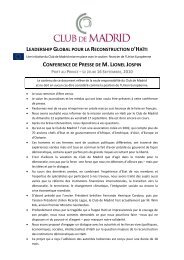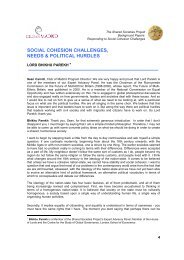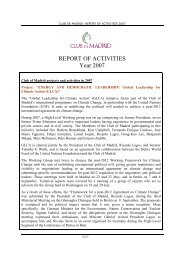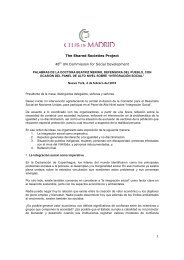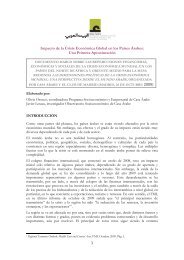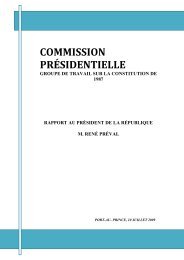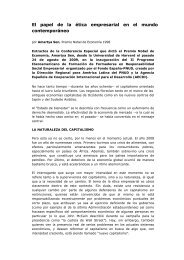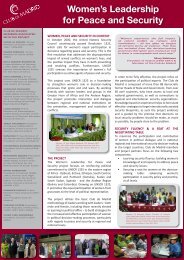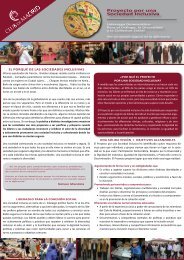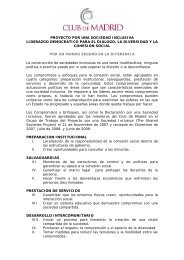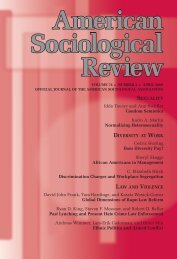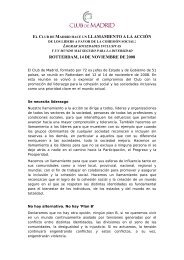Investing cultural diversity and intercultural dialogue - Business and ...
Investing cultural diversity and intercultural dialogue - Business and ...
Investing cultural diversity and intercultural dialogue - Business and ...
Create successful ePaper yourself
Turn your PDF publications into a flip-book with our unique Google optimized e-Paper software.
28 . PART III – RENEWING INTERNATIONAL STRATEGIES<br />
K The obelisk of Buenos<br />
Aires, Argentina<br />
Moreover, there can be no effective implementation of<br />
civil <strong>and</strong> political rights unless the <strong>cultural</strong> requisites that<br />
contribute to individual <strong>and</strong> collective self-realization are<br />
themselves addressed. Exercising the right to vote, for<br />
example, is to some extent contingent upon having<br />
achieved at least a minimum level of education, such as<br />
literacy. Most of these <strong>cultural</strong> requisites may be equated<br />
with <strong>cultural</strong> rights, which are enablers of capacities.<br />
Language rights are of particular importance since they<br />
provide access to a capacity essential to all other rights.<br />
Cultural rights are themselves poorly developed in<br />
international law <strong>and</strong> have received scant mention in<br />
a variety of international instruments. The broad compass<br />
of <strong>cultural</strong> rights poses numerous problems of definition,<br />
opposability <strong>and</strong> compatibility with other human rights.<br />
Collective claims in the name of <strong>cultural</strong> rights – embody -<br />
ing a rights-based approach to the promotion <strong>and</strong> the<br />
protection of <strong>cultural</strong> <strong>diversity</strong>, relating to <strong>cultural</strong><br />
creations, <strong>cultural</strong> expressions or even the sum of a<br />
community’s material <strong>and</strong> spiritual activities – are<br />
difficult to translate in terms of human rights. Further -<br />
more, it is not clear who is to guarantee the exercise of<br />
such rights. Finally, there is an ongoing debate<br />
concerning tensions between <strong>cultural</strong> rights <strong>and</strong><br />
fundamental human rights, such as the right to equal<br />
treatment <strong>and</strong> non-discrimination.<br />
Cultural <strong>diversity</strong>: A parameter of social cohesion<br />
Cultural <strong>diversity</strong> today represents a key challenge<br />
because of the multi<strong>cultural</strong> composition of most<br />
countries. The UNDP’s 2004 Human Development<br />
Report, Cultural Liberty in Today’s Diverse World, stresses<br />
the need to implement public policies that recognize<br />
difference, champion <strong>diversity</strong> <strong>and</strong> promote <strong>cultural</strong><br />
freedoms. Yet this is only possible to the extent that we<br />
are conscious of the conflicts that arise in multi<strong>cultural</strong><br />
societies from the recognition of <strong>diversity</strong>. Experience<br />
has shown that attempting to reinforce the national<br />
fabric by pretending that differences do not exist leads<br />
to <strong>cultural</strong> backlashes <strong>and</strong> that confronting <strong>cultural</strong><br />
differences is the only effective way of living with them.<br />
While a <strong>cultural</strong>ly homogenous society has never existed,<br />
the <strong>cultural</strong> web is becoming progressively more<br />
complex as globalization takes hold. In many countries



